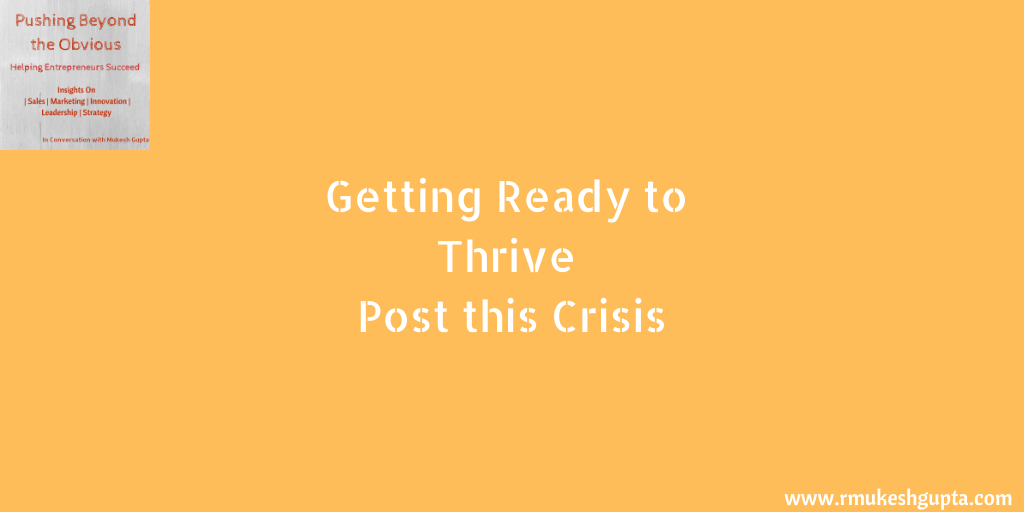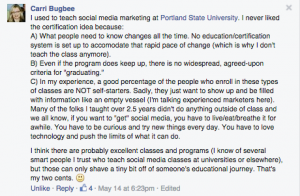
Premise:
We are already seeing a lot of signals in the economy of the upcoming tectonic shifts and the ripples that they will cause.
We have a record number of publicly listed companies in the US deciding not to give out dividends so that they can conserve cash.
We’ve seen announcements from large firms indicating that the majority of their workforce will now work from home permanently.
We have seen businesses starting to cut salaries {and in some cases not pay any salary at all}.
We have seen massive amounts of people losing their jobs {in the US} and by all counts, expect a lot more to lose their jobs before we are done with the impact of this pandemic.
We also see some large businesses cut their marketing spends significantly, some new business models being explored in desperation and finding great successes there as well.
Given this scenario, every one of us, irrespective of whether we are an entrepreneur, a senior manager in a corporate, a frontline staff at a retail outlet or an individual, need to take a pause and think about how are we going to deal with this scenario and come out stronger.
So, here are a few things that I am doing {and my thinking behind it} to come out stronger.
1. Ensure Survival
2. Plan your Revival
3. Thrive
Lets look at each one of them in detail.
Ensuring survival:
The first things first. We need to survive before we can thrive. So, we do everything that we can to survive the crisis, in three very important ways.
Physical:
I know from experience that working from home can become too busy and before you know it, your calendars can get booked for calls and meetings.
In addition, being at home with east access to snacks and food can become a double whammy. You eat a lot more and exercise a lot less. So it is important to block off time on our calendars for exercise and stick to these appointments just like we would honor any other blocks on our calendars.
Also, it is important to have a clear demarcation of start of work and end of work. For me, I get ready and put on my work clothes to indicate the start of work. I shut down my laptop, clean my desk and change into some comfy pajamas to indicate the end of work.
Emotional:
For most of us, this would be the first experience of living with our loved one’s in such close proximity for such a prolonged period of time. For some, this could potentially the loneliest time as they live alone in a strange city. For some, with little children or aging parents, things could get really busy and stressful.
It is important to realize that these are extra ordinary times and understand that it is stressful for all involved. It is important to talk to each other about the schedules and set the right expectations.
It is a good idea to have a schedule for everything – on a family calendar, made visible clearly in a central area {maybe on the refrigerator}, so that everyone knows about the schedule and can plan accordingly.
If you think you need some emotional support, reach out to your partner, friend or even seek professional help. In these days, we are seeing a lot of counsellors doing online counselling as well. It is important to take care of your emotional well-being.
Financial:
There is a lot of talk about how this pandemic and the resulting lockdown will be followed by a financial crisis, which could potentially last for a long time. No one knows how quickly businesses can recover.
What we all know for certain is that most businesses today will be struggling for cash flow issues and will also be looking for ways to survive. In order to do so, some might cut expenses, some might let people go, some might cut salaries.
So, in any case, we need to be prudent to ensure that we do the same. Most investments would be giving negative returns. So, it is important that we as individuals also need to make some prudent financial decisions.
We need cut any unnecessary expenses. We need to postpone any expense that we can. Whatever we do, we need to ensure that we have enough financial resources to tide us through the crisis {which could potentially last a year, if not longer}.
Plan your Revival
Once we have taken care of our survival, it is time for us to take a pause and think about our lives. It is times like this that allows us the opportunities to relook at where we are in our lives and decide if continuing on the same path that brought us here is the right path going forward or do we need to make course corrections.
Personally, I know that there needs to be a course correction in my life for sure. In most cases, we don’t live our lives deliberately. We just flow with the current and reach wherever the current takes us.
Times like these give us the opportunity to change this and become deliberate about how we want to lead our lives. This might mean many different things to different people.
Some of you might already be living a deliberate life – kudos to you and continue along. Some of us {including me} need to start living deliberately and create the future that we want. So, it is time for us to make the choices {some of them could be tough one’s} that we need to make to change our course of lives.
Decide:
This is when we decide what our future course of action needs to be and act upon these decisions. If the decisions require us to change our course of action, understand that this change might not be easy.
There are many things that we need to consider, including our financial health, before we make any significant change. I believe we need to have 6 different aspects of life that we need to consider and decide about.
Physical Health: Irrespective of anything else that we decide, we need to take care of our physical health. We should eat healthy, exercise, drink healthy and stay healthy. Physical health is the foundation on which we build our lives.
Emotional Health: Humans as a species are emotional creatures. So, we need to take care of our emotional well being. What this means is that we need to have a healthy relationship with our emotions and feelings. We also need to build our capacity for empathy and be able to recognize and deal with other people’s emotions and feelings as well.
Intellectual Health: As a species we are a curious lot. This is how we have come to dominate this earth and continue to learn and adapt to everything that life throws at us. So, it is important that we continue to be curious and continue to learn new things to keep our intellectual growth healthy.
Fiscal Health: It is also time for us to look at our fiscal habits and decide which one’s need to change and which one’s we need to change. Crisis like this also come with great opportunity to invest. So, if you have excess cash to invest, look at good potential investment opportunities and invest wisely.
Creative Health: As a species, we are also hard wired to create. It could be as simple as cooking a new dish to taking on a challenge that you were tagged on in a social media platform, like the Ice Bucket Challenge.
Every one of us needs to create for us to feel good about ourselves. It could be as simple or as complicated {as writing a book or making a movie}. We know what our interests are. Find ways to continually create.
Social Health: We are social animals. The fact that the social distancing {or as people call it physical distancing} has actually brought people together like no other time tells a lot about our species.
So, take an inventory of your social circles and the people that you have in them. Decide if this is what you want or if there is a need to move some people out of your social circles or include a few others that you think will bring in a lot of joy and happiness to your lives.
Thrive:
Changing our behavior is not easy. Anyone who has ever tried to create a new habit or stop an existing habit can vouch for that. So, before you can thrive, we need to build the capacity for change. There are a quite a few models that we can use for us to build this capacity for change. I have written a book about this in which I talk about the different mindsets and skills that we can use to build this capacity to thrive {You can order the book here}.
However, the simplest model that I have found is the BJ Fogg Behaviour change model created by the Stanford professor BJ Fogg. The model can be explained by a simple equation:
B {Behavior} = [M {Motivation} * A {Ability} * P {Prompts}] ^ C{Celebrate} (emphasis is mine)
What this equation simply means is that when you are trying to change a habit or build a new habit, we need to make it absolutely easy to do {break it down to its barest minimum}, which will mean that we don’t need high levels of motivation to do them and install prompts that remind us to do the action.
Let’s say, we want to create a habit of exercising every day. The equation or the model says that instead of setting a goal that we will exercise for 30 mins every day, just set yourselves the goal of wearing your exercise dress every day, right after you brush your teeth. That’s it. Then every time you do this simple action, you celebrate in your own way.
What you will realise is that once you have your exercise dress on and having celebrated the action, you might decide to exercise anyways. This is a cause for bonus celebration. These celebrations release the harmones that make us happy and reinforces our motivation to do the action.
Start with the most important area of your live, which requires the most amount of change and then move through the different areas. Start small, stay simple and build your muscle and capacity for personal change.
In conclusion:
Once we do this, not only have we ensured our survival but at the same time we are also building the capacity to evolve in a way that will allow us to thrive {in any given environment} and on our terms.
When the crisis is gone {this too shall pass}, you will find that you have come out of the crisis stronger and with all the right foundations that will allow you to thrive in the improved micro and macro environment that always follows a crisis.
Business & Finance Articles on Business 2 Community
(28)






